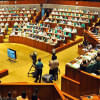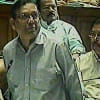An undesirable disagreement
The vociferous reaction of some ministers and MPs against the cancellation of the constitution's 16th amendment that had empowered the parliament to remove a Supreme Court judge on grounds of misconduct and incapacity took observers by surprise.
No such reaction was seen in the case of nullification of three other constitutional amendments in the last one decade. The Awami League has never blasted the apex court for scrapping three previous amendments—the 5th, the 7th and the 13th-- to the constitution.
Ziaur Rahman's government brought the 5th amendment to the constitution to validate the first martial law regime declared in 1975. The nullification of this amendment has paved the way for restoration of the original constitution of 1972.
Taking the cue from the verdict on 5th amendment, the AL-led government has reinstated some provisions of the original constitution by the 16th amendment in 2011.
It also relied on the apex court's verdict to abolish the caretaker government system by the 15th amendment after the court declared the 13th amendment that had introduced the caretaker administration, unconstitutional and void. It may be remembered the caretaker government system was introduced in the constitution by the then BNP government in 1996 in face of demand of the AL.
Abolishing the caretaker government system has allowed the AL to hold the last parliamentary election on January 5, 2014 while still in power. The AL could not have remained in power during the election had the caretaker government system existed.
Scrapping of the 7th amendment that validated the second martial law regime of General Ershad has also been welcomed by the AL-led government.
The AL-led government however did not take kindly the nullification of the constitution's 16th amendment by the High Court. It passed the 16th amendment in 2014 abolishing the chief justice-led Supreme Judicial Council to remove an SC judge.
Hours after the HC declared the 16th amendment unconstitutional and void on Thursday, some ministers and MPs launched a blistering attack on the judiciary in parliament.
The way they castigated the HC is not healthy for the proper functioning of the three organs of the state-- legislative, executive and the judiciary.
The attack rather exposed an aggressive attitude of the legislative towards the judiciary. This is unhealthy for proper functioning of all three organs and this will not have any positive result for any of them.
In their attacks on the judiciary, the ministers and the MPs claimed that the HC verdict had humiliated and undermined the parliament. Even the law minister called the judgement unconstitutional and questioned the court's jurisdiction to deliver the verdict.
Their claim, however, is largely rhetorical. The constitution says something different.
Considering the sensitivity and importance of the judiciary, the constitution guarantees its independence. It also says, judges will be independent to discharge their functions, according to article 94 (4) of the constitution.
Even in the parliament, an MP should not make any statement or comment which may undermine the independence of the judge of the Supreme Court, according to section 270 (iii) of the rules of procedure of the Jatiya Sangsad.
So the MPs' immunity under article 78 of the constitution in respect to their speeches in the parliament on judiciary is not unqualified.
The constitution does not mention any such significant things for ministers and MPs.
It is the constitution that has given its guardianship to the Supreme Court.
The SC has been given the power of judicial review by article 102 of the constitution.
In exercise of the power of judicial review, the apex court can strike down any law for inconsistency with any provision of the constitution.
And in exercise of this authority, the apex court has scrapped some constitutional amendments and some other legislations enacted by the parliament.
This means our parliament cannot make just any amendment to the constitution with two-third majority.
Our constitution has defined the boundaries of the three organs of the state.
Our parliament is empowered to enact laws, but it can not make or unmake any law at its will. It is to abide by the constitution to make laws. If any law contradicts any provision of the constitution it will be rendered void by the Supreme Court.
The 5th, 7th, and the 13th amendments to the constitution were scrapped by the court as the parliament had overstepped its powers by enacting them.
So, everything is clearly laid out in our constitution.
What the HC did on Thursday is nothing new. And the HC verdict is not final. The government can challenge the verdict by going to the higher court. The law minister has announced that the government will appeal against the verdict next week. If the HC overstepped its jurisdiction in declaring the 16th amendment unconstitutional and void, this can be corrected by the appeal. This is the legal procedure.
But without following the legal path, the way some ministers and MPs criticised the court cannot be healthy.
We note Prime Minister Shiekh Hasina, who is also leader of the House, did not say anything on the issue while she was giving valedictory speech at the parliament's 10th session.
The HC in its verdict on the 16th amendment has made some significant observations on article 70 of the constitution. According to the HC this article has fettered the members of parliament and it has imposed a tight rein on them.
Members of parliament, the HC observed, have no freedom to question their party's stance in the parliament, even if it is incorrect.
Article 70 has long been blamed for curtailing freedom of MPs. If our MPs now want to see a really independent parliament, then a fresh debate should start on how to remove the restrictions on them.

 For all latest news, follow The Daily Star's Google News channel.
For all latest news, follow The Daily Star's Google News channel. 








Comments